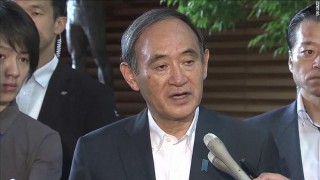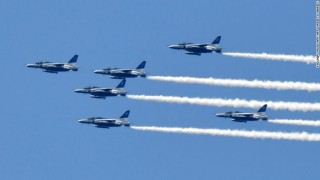Loading
Search
▼ Japan's Defense Ministry Asks For Decades-High 8.3% Budget Increase Amid Growing Threats In East Asia
- Category:Other
Japan's Defense Ministry is asking for a 8.3% budget increase in 2020, its largest rise in more than two decades, in the face of China's rapid military modernization and a looming threat from North Korea.
The Defense Ministry announced the draft budget on Wednesday afternoon, worth $51.9 billion in total spending (5.48 trillion yen), saying it would help the country's military build its capacity to respond to new threats, including cyber, space and electromagnetic warfare.
Among the new spending recommended by the Defense Ministry is $690 million to expand the Japan Self-Defense Forces' space unit and Space Situational Awareness surveillance system, and $340 million to build out its cyberspace defense unit and electromagnetic warfare capabilities.
Japan's parliament still needs to approve the budget later this year. If approved, it will be the ninth consecutive annual increase in Japan's military spending.
Stephen Nagy, senior associate professor at the Department of Politics and International Studies at Tokyo's International Christian University, said the expansion of Japan's military budget would match rapid military growth by other regional powers.
The requested budget increase, while large, was in line with similar military expenditure in other parts of East Asia, including China, South Korea and Taiwan, Nagy said.
Beijing announced a 6.6% rise in its military budget in in May 2020, bringing China's total defense expenditure to at least $178 billion.
"China builds more ships every year than the entire United Kingdom has in its forces," Nagy said. "Since 2000 it's been about a 10% increase in the Chinese military budget every year, so Japan's increase is driven by China's broad-based expansions of its military footprint in the region and globally."
Japan's Defense Ministry said that spending could increase further once a decision was made on how to replace the country's land-based Aegis missile defense system later this year. The original system was scrapped in June.
Heigo Sato, vice president of the Institute of World Studies at Tokyo's Takushoku University, said the expanded budget was a response to the rising threat from North Korea, as well as pressure from US President Donald Trump's administration for Japan to shoulder more responsibility for its own protection.
"The era of not increasing the budget is over," he said.
Sato added the proposed new budget was likely a legacy of outgoing Prime Minister Shinzo Abe, and shouldn't be read as an indication of new leader Yoshihide Suga's future defense spending plans.
Strengthening US ties
In the face of China's rapid military modernization, Japan has been building closer ties with the US and its allies in the Asia Pacific.
Then-Defense Minister Taro Kono told CNN in August that Beijing would pay a "high cost" for further intimidation in the South China Sea, a regional hotspot where the Chinese government claims a large swathe of territory.
"A free and open maritime order in the South China Sea is as important as any other place and what happens there ... will concern the international community," Kono said.
In July, the US government approved the sale of more than 100 F-35 fighter jets to Japan, which Washington claimed would "support the ... national security objectives" of America.
Nagy said that with the US economy damaged by the Covid-19 pandemic, there was likely to be more pressure for Japan to increase its defense spending and take a greater role in regional security in East Asia.
"(With this draft budget) Japan is saying ... we'll step up to the plate and increase our spending share to keep the US tethered to the region," he said. "They're willing to show their commitment to the alliance."
- September 30, 2020
- Comment (0)
- Trackback(0)



